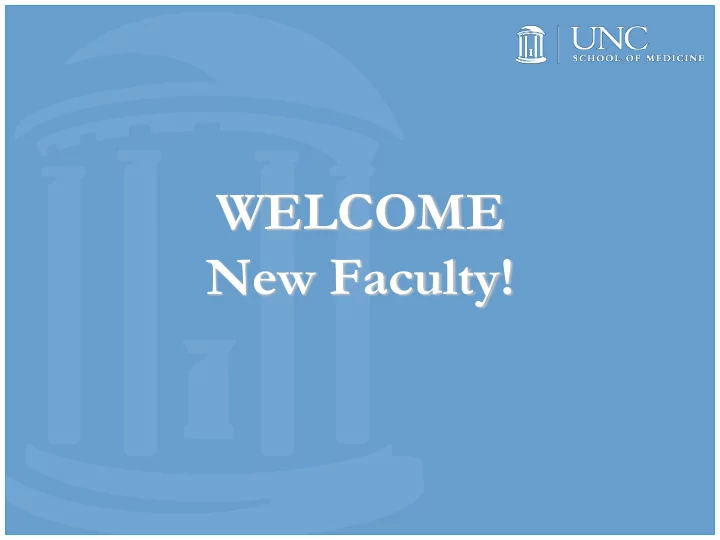

WELCOME New Faculty!
Orientation Guide These materials are intended to orient new faculty to the University of North Carolina School of Medicine and provide resources for additional information. Topics covered in this slide deck include: » Mentoring 2
Mentoring in the UNC School of Medicine Mentoring embraces our philosophy about our faculty and how important they are to this institution Susan Girdler, PhD Chair, SOM Mentoring Committee Amelia Drake, MD Executive Associate Dean for Academic Programs
Top Five Things New Faculty Should Know 1. Remember, you were hired because of the exceptional talents you bring to your position 2. You don't have to be superman or woman tomorrow 3. Figure out what matters and decide what doesn’t matter 4. Invite community 5. Have a life and take care of yourself Adapted from Sorcinelli, M.D. 2000. Principles of Good Practice: Supporting Early Career Faculty. Washington, D.C.: American Association of Higher Education.
Mentors, Mentees and their Organizations Benefit from the Practice of Mentoring
Having a Mentor is associated with Greater Satisfaction in Academic Socialization for new Assistant Professors (n = 214) 20 Mentored Satisfaction w ith Socialization Process * 19 * Not Mentored 18 17 16 * 15 14 13 12 11 10 Loyalty Connectedness Adequate information Academ ic Socialization * p < 0.05. Schrodt, Cawyer, & Sanders (2003) Communication Education , 52 (1), 17-29.
Enhance research/clinical/teaching practices Foster Independence Broker Opportunities and Career Enhancing Networking Mentoring Develop Career Management Skills Advocate and Offer Protection Identify Opportunities for Development Kram, K.E. (1985). Mentoring at work: Developmental relationships in organizational life . Glenview, IL: Scott Foresman and Company.
Promote Socialization to the Profession and Institution Provide Encouragement, Enhance Confidence Psychosocial Mentoring Help Clarify Professional Identity Model Professional Behaviors, Attitudes and Values
Every Department in the UNC School of Medicine Has a Junior Faculty Mentoring Plan o Be proactive and make sure that you are a part of the plan o Craft an effective relationship o Stay involved in the process
Traditional Mentoring Advantages: • Facilitates professional advancement of mentees early in their career • Mentees benefit from extensive knowledge, organizational wisdom, contacts, sponsorship Potential Limitations: • Difficulty in finding enough senior faculty with time and experience to serve as effective mentors • An implicit power differential exists
Committee Mentoring Advantages: • Exposure to multiple perspectives • Helpful when there is a limited number of senior mentors Potential Limitations: • Content of mentoring interactions are more homogenous and less individualized • Difficulty in coordinating schedules • Conflicting advice
Peer Mentoring Advantages: • Absence of power differentials • Greater likelihood of shared perspectives, and challenges • Collaboration • Social support Potential Limitations: • Inability to leverage knowledge of senior colleagues • Challenging for peers to organize their interactions and agendas
Multiple Roles for Mentors o Career advocate, sponsor, strategist o Tenure and promotion coach o Feedback communicator o Protector o Counselor o Networking o Teaching, research, clinical coach Think Multiple Mentors!
Personal Attributes of Successful Mentors o Availability o Giving o Honesty o Patience o Reliability o Strong interpersonal skills o Caring o Appreciation for individual differences o Sharing
Personal Attributes of Successful Mentees o Accept and be open to mentoring! o Be accountable and diligent about deadlines, etc. o Take ownership of career o Stay organized – provide materials in advance of meetings, prepare questions for discussion, provide summary notes after meetings
Mentoring is a developmental RELATIONSHIP with focus on the mentee Initiation Cultivation Separation and Redefinition Holmes, D. (2010). Mentoring: Making the transition from mentee to mentor. American Heart Association Journal, 121, 336. Chong, S. (2009). Mentoring: Are we doing it right? Annals Academy of Medicine, 38(7), 643.
Current Mentoring Initiatives and Additional Resources • SOM Mentoring Task Force developing resources to support departments in mentoring: • those underrepresented in medicine • mid-career faculty • faculty on diverse career tracks • Center for Faculty Excellence • NC Translational and Clinical Science Award (NC TraCS) • Office of Graduate Education
Recommend
More recommend